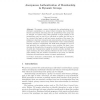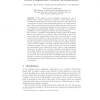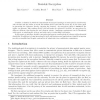152 search results - page 23 / 31 » On the Key Dependent Message Security of the Fujisaki-Okamot... |
EUROCRYPT
2005
Springer
15 years 5 months ago
2005
Springer
We introduce a new type of Identity-Based Encryption (IBE) scheme that we call Fuzzy Identity-Based Encryption. In Fuzzy IBE we view an identity as set of descriptive attributes. ...
FC
1999
Springer
15 years 4 months ago
1999
Springer
Abstract. We present a series of protocols for authenticating an individual’s membership in a group without revealing that individual’s identity and without restricting how the...
110
click to vote
CRYPTO
2005
Springer
15 years 5 months ago
2005
Springer
In the setting of secure multiparty computation, a set of parties wish to jointly compute some function of their inputs. Such a computation must preserve certain security propertie...
APPROX
2004
Springer
15 years 5 months ago
2004
Springer
A quantum encryption scheme (also called private quantum channel, or state randomization protocol) is a one-time pad for quantum messages. If two parties share a classical random s...
CRYPTO
1997
Springer
15 years 4 months ago
1997
Springer
Consider a situation in which the transmission of encrypted messages is intercepted by an adversary who can later ask the sender to reveal the random choices
and also the secret ...



